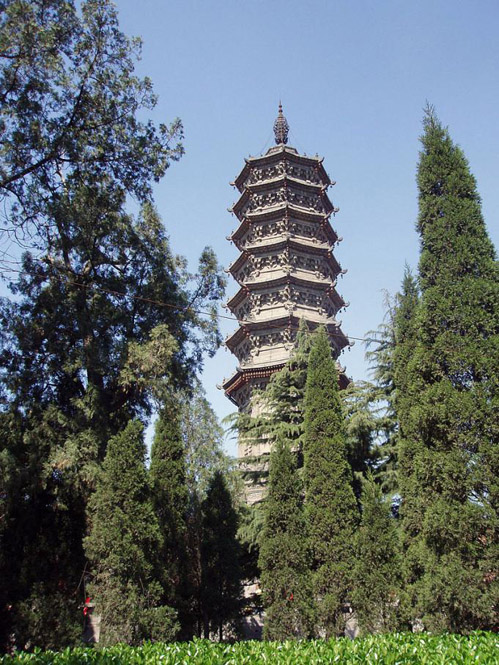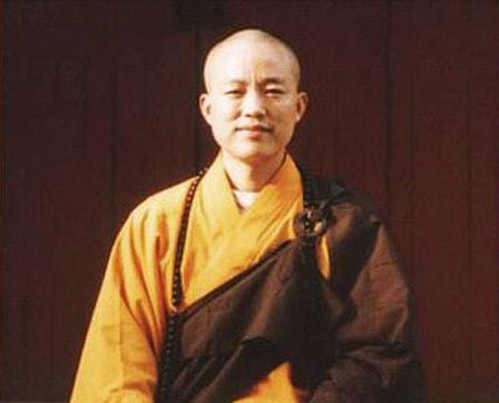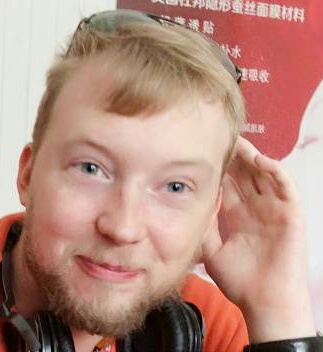How the rejuvenation of Buddhism in China may help solve our everyday problems in the west

The Bailin temple (柏林寺) is just a few hours south of Beijing by car, but spiritually it’s another world. The high-rise commercial centers are replaced by the majestic Zhaozhou Pagoda (赵州塔), pictured above; the hustle and bustle of the big city is replaced with the quiet shuffle of monk’s robes. Nevertheless Bailin temple is neither dusty nor antiquated, but rather an extraordinary hub of work and worship that is helping Buddhist thought return to Chinese life and push forwards into the future.
The literal translation of the Chinese name ‘Cypress Orchid Temple’ is a suitable name for the beautiful temple compound that's peppered with an assortment of greenery. The temple has a history of over 1700 years, and has been an important center in the development of Chan Buddhism, a distinctively east Asian Buddhism that would later become known as Seon in Korea and Zen in Japan and the west. The monks here are lively and friendly, not least the head abbot, Master Ming Hai. His playful yet focused demeanor and unusual turns of phrase are everything that you would expect from the master of a temple that includes the Zen master Zhaozhou (Joshu Jushin) amongst its former abbots. For those unfamiliar with Zhaozhou’s place in Buddhist history, he’s a Tang dynasty master renowned for helping people reach enlightenment through amusing and often counterintuitive methods. Perhaps most famously, when asked if dogs have a Buddhist nature, Zhaozhou replied, saying “wu”. This wonderful double entendre works so well because in Chinese ‘wu’ is a homophone that could either be the sound of incomprehensible murmuring, or a negation similar to ‘no’ depending on the way that it is written (唔 and 无 respectively). This kind of ambiguous riddle would go on to become one of the great hallmarks of Zen, the koan, a paradoxical anecdote or riddle without a solution. Master Ming Hai has a similar penetrating insight and offbeat humor to his predecessors. In one sense, this is unsurprising as he also has a lot to be happy about - China is experiencing a massive resurgence in Buddhism both in popular culture and academia. The best figures suggest that there are over 200 million active Buddhists in China, and as the climate in China changes this number is set to increase as the community becomes more open. The monastic Sangha (community) now has an estimated half-a-million monks and nuns in over 33,000 temples. Despite this resounding resurgence, Master Ming Hai sees this as the beginning of a story rather than the end - he rejuvenation of Chinese Buddhism offers opportunities to reach out in many directions, and the monks of Bailin temple are acutely aware of this.

No one understands this better than Master Ming Hai himself; under his stewardship the temple has started providing end of life care, written books for popular consumption and made a number of TV appearances and podcasts. When asked about the focus the temple has on helping to provide unconventional services Master Ming Hai seems a little perplexed. “The temple is here to help alleviate the suffering of sentient beings, we just try to do that however we can” he told me in Chinese. This attitude is unsurprising as he is also the third generation disciple of Chinese ‘Humanistic Buddhism’, a reformation movement that happened in Chan after the end of the Qing Dynasty. World-renowned Zen Buddhist monk Master Empty Cloud advocated reformation in Buddhism, including open dialog with scientists as well as other religions and philosophical traditions. His conclusions led him to found Humanistic Buddhism. As the name would imply this new development follows the great Chan tradition of integrating Buddhism into our everyday lives, engaging with communities to liberate human beings collectively but aims to do so in a global, multicultural and multifaith context. These teachings were passed down and developed by Master Jing Hui, Master Ming Hai's teacher.
Master Ming Hai has his eye on introducing the wisdom that this modern twist on Chan provides to the west. Readers will be aware that the introduction and growth of Buddhism in the west provides both enormous opportunities and challenges. One of the most difficult things for people in the west is integration of Buddhist practice into everyday lives without the sociocultural foundations or large Sangha that can be found in many countries outside the west. Master Ming Hai and his team have dedicated themselves to finding a way to support people and practitioners in the west. This comes in the form of an English language podcast and live audio stream called Shifu Says that fields questions from all over the world, helping people integrate Chan Buddhist wisdom into their everyday lives. So often there is clarity about the virtues and precepts in Buddhism – we know it’s great to exercise compassion and wisdom - but so often it’s difficult to know how exactly to apply them in each situation. This is the gap that Master Ming Hai hopes to fill. Be it questions about friends or family, work, or relationships, there are no questions from which he will shy away. The Shifu Says podcast has already offered practical advice on how to deal with domestic violence, death in the family, extramarital affairs and other topics. So often those practical particularities of any given situation can give cause for much deliberation, and the Sangha in the west now have a new tool to help think about them clearly.
The podcast is now recorded on site at the temple and hopes to expand into other projects with the help of the generous patronage provided by BON, a Beijing-based media network. Despite his increasing media presence, Master Ming Hai remains predictably modest. “I’m just lucky that I enjoy being around people” he told me “there is so much more to be done.”
Those interested in the podcast and the continuing work of Master Ming Hai can visit the website at www.shifusays.net or download the podcast for free by searching ‘Shifu Says” in the Apple store or through Google Play. You can also send your own worries and concerns to questions@shifusays.net that may be discussed in the future episodes.


